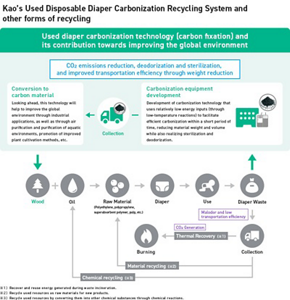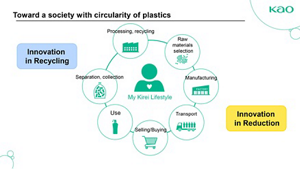Kao and Kyoto University Begin Verification Testing of a Used Disposable Diaper Carbonization Recycling System in Saijo City, Ehime Prefecture, Japan
Overview
In January 2021, Kao Corporation and Kyoto University are starting verification testing for a Used Disposable Diaper Carbonization Recycling System in collaboration with Saijo City, Ehime Prefecture, Japan, where Kao Sanitary Products Ehime*1 is located. Through this field testing, Kao and Kyoto University will be contributing towards easing the burden on the environment by reducing CO2 emissions through the conversion of used disposable diapers into carbon material. In the future, besides working to promote industrial applications for carbon material made from disposable diapers, Kao and Kyoto University will continue to undertake research and technology development aimed at improving the global environment through air purification, purification of aquatic environments, enhancement of plant cultivation techniques, etc. Social implementation of the new recycling system is expected to begin in or after 2025.
Development of the recycling system was undertaken as a collaborative project between Kao and Kyoto University Open Innovation Institute.*2
-
* 1 Established in 1978, Kao Sanitary Products Ehime functions as a center for the supply of sanitary products, undertaking production of Merries and Laurier brand products.
-
* 2 The Kyoto University Open Innovation Institute is a research center that plans and conducts full and large-scale collaborative studies between organizations based on university-wide research themes.

Background
Currently, over 2 million tons of used diapers are disposed of as waste every year, mostly by incineration; it has been estimated that they account for around 4–6% of all incinerated waste in Japan. Due to the fact that diapers absorb moisture, in some cases the disposal of used diapers by incineration may lead to a deterioration in processing efficiency at incinerator plants. It is anticipated that, in the future, the aging of the population will lead to increased adult diaper usage, which in turn will result in an increase in the amount of waste generated, thereby having a negative impact on the environment. There is thus a clear need for the development of effective diaper recycling technologies, but there are various issues that make the development of such technologies a challenging task. The main problems affecting the recycling of used diapers include: (1) As used diapers contain excreta, their weight increases to 2–4 times the original weight, resulting in extra bulk when storing, collecting or transporting them, and there are also sanitary issues such as bad odor, etc.; this necessitates frequent collection. (2) To recycle products, the constitute components need to be separated out. However, because disposable diapers consist of paper pulp and various types of plastic, separating the different materials poses technical problems.
To overcome these problems, it was decided that verification testing of the Used Disposable Diaper Carbonization Recycling System would begin in Saijo City.
Research methods
In concrete terms, this project involves the development of carbonization equipment that carbonizes used disposable diapers prior to collection. The key points that are being emphasized when developing the equipment include the need for rapid, efficient carbonization that requires only relatively low energy inputs (i.e., use of low-temperature reaction technology), so that the weight and volume of the used diapers can be reduced while also implementing sterilization and deodorization. In addition to resolving the sanitary issues, reducing the weight and volume of the used diapers will also reduce the frequency with which collection needs to be performed. When used disposable diapers are incinerated, they generate CO2 emissions. However, when carbonization is performed, the carbon is fixed in carbon material, which makes it possible to reduce the amount of CO2 emitted, thereby reducing the negative impact on the environment. Work is also underway on the development of technology aimed at converting the used diapers that have been carbonized using the carbonization equipment into carbon material.
The verification testing in Saijo City, which is being implemented in collaboration with Saijo City Government, involves recycling from a childcare facility that generates used disposable diapers. Starting from January 2021, used diaper processing equipment (which already has a track record of successful use in a care facility) is being installed in the childcare facility. Besides undertaking verification in relation to on-site operation issues such as the amount of waste generated, the amount of work performed, how well operation can be maintained, etc., the used diaper processing equipment will also be used as a foundation for proceeding with the development of carbonization equipment. In or after April 2021, the carbonization equipment that has been developed for the project will be installed, so that sterilization, deodorization and bulk reduction can be performed before used diapers are collected. As the carbonized used diapers will take up less space, the frequency of collection can be kept down to once or twice a month. After collection, the recycled material will be used to improve the environment and to foster the growth of plants in the childcare facility's gardens. Kao and Kyoto University will also continue with R&D aimed at conversion into carbon material such as activated carbon, etc.
As part of its childcare support measures, Kao will also be provide Merries baby diapers to the childcare facility where the verification testing is being implemented. Up until now, parents/guardians of children who use the childcare facility had to take their own diapers when dropping the children off at the facility, with used diapers being disposed of by the facility as waste and collected for incineration. The introduction of the Used Disposable Diaper Carbonization Recycling System means that disposable diapers will now be provided by the childcare facility, which is expected to reduce the burden on both parents/guardians and childcare facility staff.
The knowhow obtained through this verification testing will be made available to cities throughout Japan, and also to countries in Southeast Asia and other parts of the world where plastic waste is a serious problem, thereby contributing towards addressing the issues associated with used disposable diapers on an even wider scale.
Anticipated future spillover effects
The adoption of the Used Disposable Diaper Carbonization Recycling System will help to resolve the issues affecting the recycling of used disposable diapers, and the development of industrial applications for carbonized material made from used diapers will help to improve the global environment through recycling, CO2 emissions reduction, and solution of issues relating to plastic waste, thereby contributing towards the achievement of the United Nations' Sustainable Development Goals (SDGs).
Related Information
Initiatives for Kao's ESG Strategy, the Kirei Lifestyle Plan and plastic circularity in society
Recognizing its responsibility as an enterprise that provides products which people use on a regular basis in their daily lives, the Kao Group takes active steps to reduce the environmental footprint of its products throughout the entirety of the product lifecycle. In April 2019, Kao launched the Kirei Lifestyle Plan, its ESG (environmental, social and governance) strategy, which incorporates 19 key leadership actions. Kao is now beginning the full implementation of related activities by enhancing its core value of Yoki-Monozukuri that it has built up through its corporate activities to realize "Yoki-Monozukuri with ESG integration (ESG-driven Yoki-Monozukuri)." Kao defines Yoki-Monozukuri as a strong commitment by all members to provide products and brands of excellent value for consumer satisfaction. It plans to further strengthen its initiatives incorporating environmental and social considerations.
Regarding the issue of plastic waste, which is a significant problem for society, in 2018 Kao released "Our Philosophy & Action on Plastic Packaging," which details its approach to plastic packaging. In addition, in September 2019, Kao announced that it would be focusing on Innovation in Reduction and Innovation in Recycling, so as to help realize a society characterized by effective plastic resource circulation.
In the future, the Kao Group will continue to implement its unique ESG activities globally, so as to deliver satisfaction and enriched lives for people around the world, and contribute to the sustainability of society.

About Kao
Kao creates high-value-added products that enrich the lives of consumers around the world. Through its portfolio of over 20 leading brands such as Attack, Bioré, Goldwell, Jergens, John Frieda, Kanebo, Laurier, Merries and Molton Brown, Kao is part of the everyday lives of people in Asia, Oceania, North America and Europe. Combined with its chemical division, which contributes to a wide range of industries, Kao generates about 1,500 billion yen in annual sales. Kao employs about 33,000 people worldwide and has 130 years of history in innovation. Please visit the Kao Group website for updated information.
Media inquiries should be directed to:
Corporate Communications
Kao Corporation
